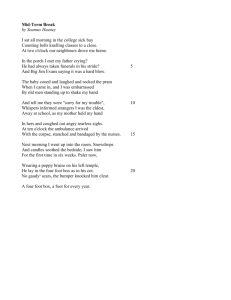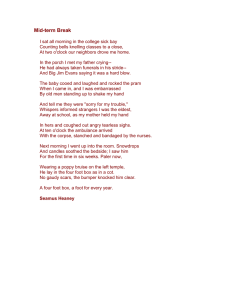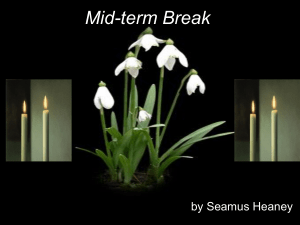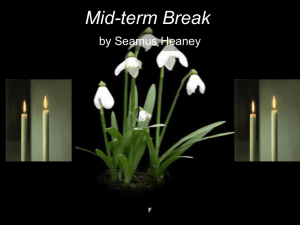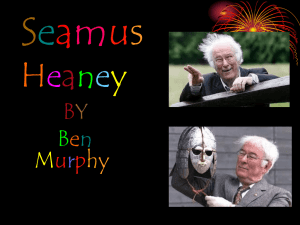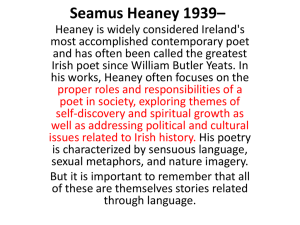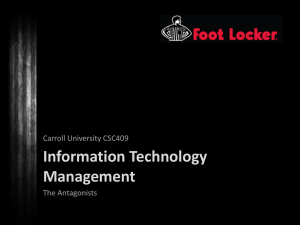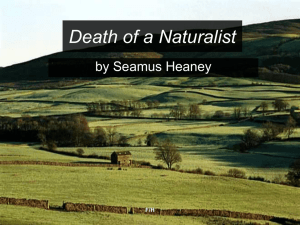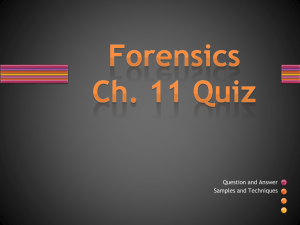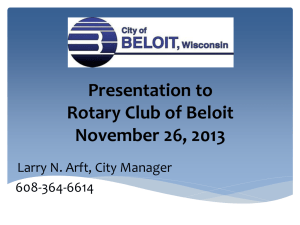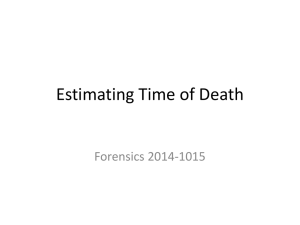Mid-Term Break: Seamus Heaney Poetry Analysis
advertisement
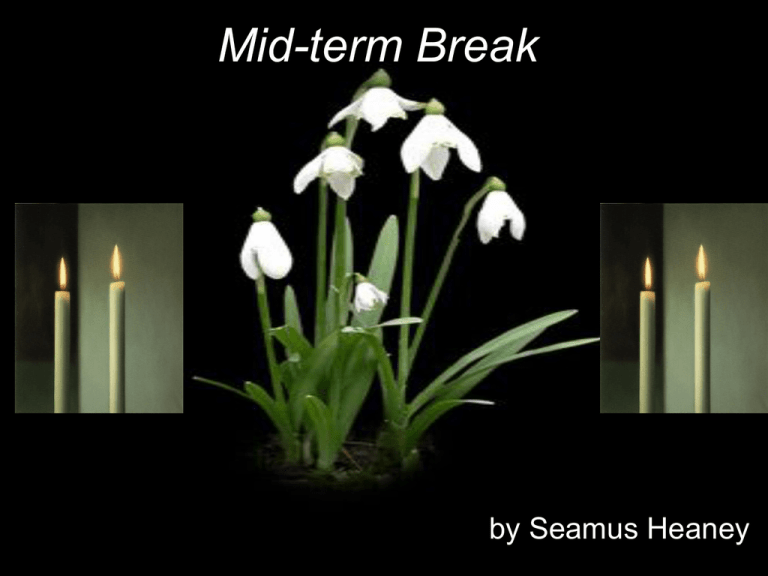
Mid-term Break by Seamus Heaney Mid-term Break Think about what the title implies. What will this poem be about? by Seamus Heaney Context: • In 1951, Seamus Heaney was 12 years of age and he went to St. Columb’s College in Derry where he was a boarding pupil. • Whilst attending the college, Heaney’s younger brother Christopher was killed in a road accident and this poem involves the poet recalling the events that happened to him after this. In what sense is the title misleading? What effect does this have on the reader when they realise what the subject really is? F A neighbour then arrived and took the poet home, where it becomes clear that something terrible has happened. His father was crying and this was entirely out of character and the family friend Jim Evans was there. Old men greet the child and shake his hand. Then the body arrives. I sat all morning in the college sick bay Counting bells knelling classes to a close, At two o'clock our neighbors drove me home. In the porch I met my father crying-He had always taken funerals in his stride-And Big Jim Evans saying it was a hard blow. The baby cooed and laughed and rocked the pram When I came in, and I was embarrassed By old men standing up to shake my hand The poem begins with the narrator recalling being a child in the college sick bay – he was not ill and had been taken there as something had happened. And tell me they were "sorry for my trouble," Whispers informed strangers I was the eldest, Away at school, as my mother held my hand In hers and coughed out angry tearless sighs. At ten o'clock the ambulance arrived With the corpse, stanched and bandaged by the nurses. Next morning I went up into the room. Snowdrops And candles soothed the bedside; I saw him For the first time in six weeks. Paler now, Wearing a poppy bruise on the left temple, He lay in the four foot box as in a cot. No gaudy scars, the bumper knocked him clear. A four foot box, a foot forF every year. The poem ends with a change of scene and time, as the child enters the room of his dead brother the next morning and he attempts to make sense of what has happened. Why is he in sick bay? Suggests the boredom of waiting, the confused calm before the storm ‘hard blow’ has a double meaning and emphasises the nature of the scene. What are the two meanings? I sat all morning in the college sick bay Counting bells knelling classes to a close, At two o'clock our neighbors drove me home. In the porch I met my father crying-He had always taken funerals in his stride-And Big Jim Evans saying it was a hard blow. ‘knelling’ suggests funereal bells rather than a change of lessons. Fore-shadowing events to come The baby cooed and laughed and rocked the pram When I came in, and I was embarrassed By old men standing up to shake my hand And tell me they were "sorry for my trouble," Whispers informed strangers I was the eldest, Away at school, as my mother held my hand Stark image of a distraught parent. He’s unable to cope as at other funerals. Why? Alliteration stresses the feeling of something ending In hers and coughed out angry tearless sighs. At ten o'clock the ambulance arrived With the corpse, stanched and bandaged by the nurses. Next morning I went up into the room. Snowdrops And candles soothed the bedside; I saw him For the first time in six weeks. Paler now, Emphasises the passage of time and contrasts with Wearing a poppy bruise on the left temple, the slowness with which He lay in the four foot box as in a cot. No gaudy scars, the bumper knocked him clear.the poet experienced it A four foot box, a foot forF every year. The baby doesn’t know what’s happening and this is in contrast to Heaney’s reactions Assonance used by Heaney. The short ‘a’ sounds could suggest the abrupt end to his brother’s life. Heaney doesn’t seem to see his brother; he sees a corpse wrapped in the failed attempts to save him. I sat all morning in the college sick bay Counting bells knelling classes to a close, At two o'clock our neighbors drove me home. In the porch I met my father crying-He had always taken funerals in his stride-And Big Jim Evans saying it was a hard blow. The baby cooed and laughed and rocked the pram When I came in, and I was embarrassed By old men standing up to shake my hand And tell me they were "sorry for my trouble," Whispers informed strangers I was the eldest, Away at school, as my mother held my hand In hers and coughed out angry tearless sighs. At ten o'clock the ambulance arrived With the corpse, stanched and bandaged by the nurses. Next morning I went up into the room. Snowdrops And candles soothed the bedside; I saw him For the first time in six weeks. Paler now, Wearing a poppy bruise on the left temple, He lay in the four foot box as in a cot. No gaudy scars, the bumper knocked him clear. A four foot box, a foot forF every year. Heaney draws the reader through this unusual scene. Heaney himself is ‘embarrassed’ by the attention of the ‘old men’ What reaction would he have to his mother’s ‘angry tearless sighs’ Change of scene from the hectic, embarrassing business of Heaney’s return home. Heaney comes to terms with the loss and accepts ‘the corpse’ as his brother. I sat all morning in the college sick bay Counting bells knelling classes to a close, At two o'clock our neighbors drove me home. In the porch I met my father crying-He had always taken funerals in his stride-And Big Jim Evans saying it was a hard blow. They literally sooth Heaney and allow him to start the grieving process. The baby cooed and laughed and rocked the pramThese images are When I came in, and I was embarrassed symbolic, both for By old men standing up to shake my hand the family and the And tell me they were "sorry for my trouble," Whispers informed strangers I was the eldest, Away at school, as my mother held my hand reader, of new-life and In hers and coughed out angry tearless sighs. At ten o'clock the ambulance arrived With the corpse, stanched and bandaged by the nurses. Next morning I went up into the room. Snowdrops And candles soothed the bedside; I saw him For the first time in six weeks. Paler now, Wearing a poppy bruise on the left temple, He lay in the four foot box as in a cot. No gaudy scars, the bumper knocked him clear. A four foot box, a foot forF every year. Stark image is left hanging at the end of the stanza The bruise is not a part of his brother. Heaney sees him as metaphorically ‘wearing’ it, as if it could be removed I sat all morning in the college sick bay Counting bells knelling classes to a close, At two o'clock our neighbors drove me home. Why has Heaney chosen a poppy? In the porch I met my father crying-He had always taken funerals in his stride-And Big Jim Evans saying it was a hard blow. Think about the symbolism associated with poppies and think The baby cooed and laughed and rocked the pram of it as a visual image When I came in, and I was embarrassed as well By old men standing up to shake my hand And tell me they were "sorry for my trouble," Whispers informed strangers I was the eldest, Away at school, as my mother held my hand Contrast between the peaceful, clean image with that of earlier In hers and coughed out angry tearless sighs. At ten o'clock the ambulance arrived With the corpse, stanched and bandaged by the nurses. Next morning I went up into the room. Snowdrops And candles soothed the bedside; I saw him For the first time in six weeks. Paler now, Wearing a poppy bruise on the left temple, He lay in the four foot box as in a cot. No gaudy scars, the bumper knocked him clear. A four foot box, a foot forF every year. As a baby might, sleeping. Again the contrast between the hectic start and calm end is obvious Clear factual understanding of what has happened and Heaney doesn’t shy away from that I sat all morning in the college sick bay Counting bells knelling classes to a close, At two o'clock our neighbors drove me home. In the porch I met my father crying-He had always taken funerals in his stride-And Big Jim Evans saying it was a hard blow. For the first time we learn the child’s age as Heaney bitterly jokes that the coffin is a measure for his life The baby cooed and laughed and rocked the pram When I came in, and I was embarrassed By old men standing up to shake my hand Final line stands alone and draws the readers full attention. Again the poignantly humorous reference to the coffin as a box stresses Heaney’s childlike bitterness And tell me they were "sorry for my trouble," Whispers informed strangers I was the eldest, Away at school, as my mother held my hand In hers and coughed out angry tearless sighs. At ten o'clock the ambulance arrived With the corpse, stanched and bandaged by the nurses. Next morning I went up into the room. Snowdrops And candles soothed the bedside; I saw him For the first time in six weeks. Paler now, Wearing a poppy bruise on the left temple, He lay in the four foot box as in a cot. No gaudy scars, the bumper knocked him clear. A four foot box, a foot forF every year. The rhyming couplet serves to stress the tragedy in the reader’s mind I sat all morning in the college sick bay Counting bells knelling classes to a close, At two o'clock our neighbors drove me home. In the porch I met my father crying-He had always taken funerals in his stride-And Big Jim Evans saying it was a hard blow. This is an incredibly personal piece of poetry. As a reader, what is your reaction to The baby cooed and laughed and rocked the pramreading this poem? When I came in, and I was embarrassed By old men standing up to shake my hand And tell me they were "sorry for my trouble," Whispers informed strangers I was the eldest, Away at school, as my mother held my hand In hers and coughed out angry tearless sighs. At ten o'clock the ambulance arrived With the corpse, stanched and bandaged by the nurses. Heaney uses contrasting images and emotions throughout this poem. Why might this be? Next morning I went up into the room. Snowdrops And candles soothed the bedside; I saw him End-stopping For the first time in six weeks. Paler now, Wearing a poppy bruise on the left temple, He lay in the four foot box as in a cot. No gaudy scars, the bumper knocked him clear. A four foot box, a foot forF every year. of the final stanza stresses the calm, contemplative nature of the young Heaney’s private grieving Themes • Childhood – The poem involves the poet recalling an event from his own childhood. • It involves the narrator ‘growing up’ due to the terrible nature of the experience. • Death / Loss – The fact that the poem deals with the death of a child, encourages the reader and narrator to question the pointlessness of death. • Focus of the poem is on the reactions of people to death and the way people attempt to make sense of the loss. • Memory – Poem recalls an event from the past and this links it to other poems in the collection that involve looking back in order to see the present and future clearly. Review • Note the reactions of the two parents - how does the reader react to this? • With whom, do you think, is the mother angry? • How does the poem contrast the fuss of the homecoming with the calmness of the scene when Seamus sees his brother's body? • What do you think is the meaning of the poem's last line? • What is your reaction to this poem?
